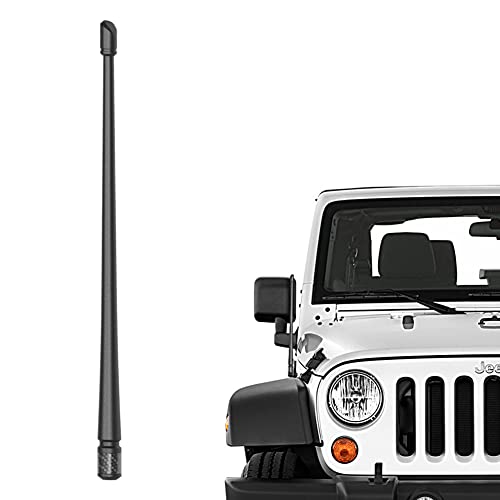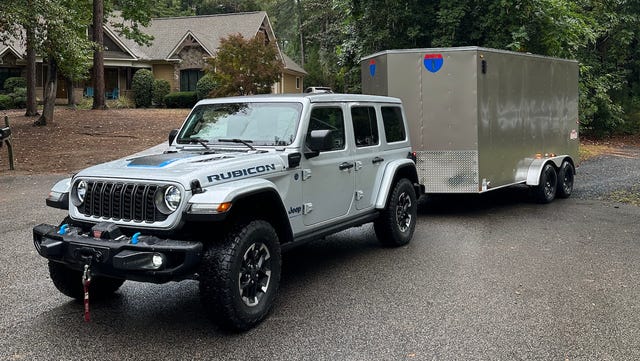How Many Kwh to Charge Jeep 4Xe: Maximize Your Electric Vehicle Efficiency
To fully charge a Jeep 4Xe, it requires an average of 14-20 kWh (kilowatt-hours) of electricity. Introducing the Jeep 4Xe, an exciting and efficient hybrid vehicle that combines the power of a traditional Jeep with the benefits of electric technology.
One of the key considerations for Jeep 4Xe owners is knowing how many kilowatt-hours (kWh) are needed to charge their vehicle. When fully charging the Jeep 4Xe, you can expect to use an average of 14-20 kWh.
This amount of electricity is required to replenish the vehicle’s battery and ensure optimal performance. We will explore the charging process and provide valuable insights for those interested in the Jeep 4Xe and its energy requirements. Stay tuned to learn all about the electrifying capabilities of the Jeep 4Xe and how to power up this exceptional vehicle.
Understanding The Electric Vehicle Efficiency
Electric vehicle efficiency plays a crucial role in maximizing the benefits of owning an electric vehicle. Several key factors influence the efficiency of an electric vehicle, including battery technology, regenerative braking, aerodynamics, and vehicle weight. By understanding and optimizing these factors, electric vehicle owners can experience longer driving ranges, shorter charging times, and reduced energy costs.
Battery technology determines the amount of energy that can be stored and how efficiently it is used to power the vehicle. Regenerative braking helps capture and recycle energy generated during braking, thereby further improving efficiency. Aerodynamics and vehicle weight also impact the energy consumption of an electric vehicle.
By optimizing these aspects, owners can ensure that their vehicle uses electricity more effectively, resulting in a more sustainable and cost-efficient driving experience.

Decoding The Jeep 4Xe Electrical System
The Jeep 4Xe electrical system is fascinating to decode. Let’s begin by understanding kilowatt-hours (kWh). The kWh is a unit of energy measurement that helps us determine how much power is needed to charge the Jeep 4Xe. Moving on to the charging options and capabilities, the Jeep 4Xe offers various methods to charge its electrical system.
The availability of charging stations and home charging options allows for flexibility and convenience. With a clear understanding of the electrical setup, it becomes easier to plan and manage the charging process efficiently. Whether you opt for public charging stations, home charging, or a combination of both, the Jeep 4Xe is designed to provide a seamless charging experience, offering both eco-friendly motives and optimal performance.
Factors Affecting Kwh Required To Charge Jeep 4Xe
Factors such as the battery capacity and usable kWh of the Jeep 4Xe, as well as its charging speed and efficiency, play a crucial role in determining the amount of kWh required to charge it. The battery capacity essentially determines the total amount of kWh that can be stored and used by the vehicle.
However, it’s important to note that the usable kWh may differ from the total capacity due to certain factors. Analyzing the charging speed and efficiency is also crucial, as it determines the time required to charge the Jeep 4Xe fully.
Additionally, the driving style can impact the overall efficiency of the electric vehicle, affecting the number of kWh used per mile driven. By considering these factors, Jeep 4Xe owners can make informed decisions about charging their vehicle to ensure optimal performance and efficiency.
Calculating The Kwh Required For A Full Charge
To calculate the kWh required for a full charge of the Jeep 4Xe, you need to understand the vehicle’s battery size and range. The battery capacity of the Jeep 4Xe is specified as X kWh, and its range is Y miles on electric power alone.
By dividing the battery capacity by the electric range, you can estimate the kWh required for a full charge. However, it’s important to consider charging losses and inefficiencies that may occur during the charging process. These losses can vary based on factors such as temperature, charging method, and battery condition.
Taking into account these variables will provide a more accurate estimate of the number of kWh required to charge the Jeep 4Xe fully.
Maximizing Electric Vehicle Efficiency
To maximize the efficiency of your Jeep 4XE’s charging routine, consider utilizing regenerative braking and energy-saving features. These features can help to capture and store energy that would otherwise be lost during braking, thus increasing the overall charging efficiency. Additionally, planning efficient routes and managing energy consumption can further optimize the charging process.
By mapping out routes that minimize the distance traveled and considering factors such as traffic and elevation changes, you can reduce energy consumption and, in turn, the amount of kWh needed to charge your Jeep 4Xe. Implementing these tips can enhance the efficiency of your electric vehicle and contribute to a more sustainable and cost-effective charging experience.
Factors To Consider For Home Charging Setup
When setting up your home charging solution for your Jeep 4xe, there are several factors to consider. Firstly, evaluate the charging speeds and options available to you, such as Level 1, Level 2, and Level 3 charging. Each option varies in terms of speed and convenience.
Secondly, navigating the costs and incentives of home charging installation is crucial. Understand the upfront costs and potential savings through incentives or rebates. Additionally, research any ongoing expenses associated with power consumption, such as kilowatt-hour (kWh) rates. By considering these factors, you can determine the most efficient and economical home charging setup for your Jeep 4XE that meets your needs.
Utilizing Public Charging Infrastructure
Public charging infrastructure plays a vital role in effectively charging the Jeep 4Xe. Understanding the network of public charging stations is crucial. Charging speeds and availability need to be considered when planning to charge your vehicle. Utilizing public charging stations efficiently is important to avoid any inconvenience.
Planning ahead and knowing the locations of charging stations can help ensure a smooth charging experience. Public charging infrastructure provides the convenience and accessibility that electric vehicle owners need. It is essential to utilize this infrastructure to leverage the capabilities of the Jeep 4Xe fully.
By utilizing public charging effectively, owners can confidently rely on electric vehicles for their transportation needs.
Charging Efficiency Maintenance And Tips
Charging efficiency, maintenance, and tips encompass optimal practices for preserving and maximizing charging efficiency. Proper charging techniques are essential in maintaining battery health. By monitoring and troubleshooting charging issues, you can ensure a smooth and efficient charging process. Regularly checking and maintaining the charging equipment is crucial.
Avoid overcharging or undercharging the battery to prevent premature wear and tear and to maintain overall efficiency. Optimize your charging routine by scheduling charging sessions during off-peak hours to take advantage of lower electricity rates. Consider using smart charging solutions that allow you to monitor and control the charging process remotely.
Adhering to these practices will help you achieve the most efficient charging experience for your Jeep 4Xe.
Case Studies: Real-World Examples Of Jeep 4Xe Charging Scenarios
Case studies reveal real-world examples of how Jeep 4Xe vehicles require varying kWh for charging in different scenarios. These insights facilitate the analysis of specific charging needs for different driving patterns. By learning from the experiences of actual Jeep 4Xe users and their efficiency strategies, we can understand the factors that impact the kWh required for charging.
This information is valuable in planning for charging infrastructure and optimizing energy usage. From daily commutes to long-distance journeys, the diverse charging situations and requirements of Jeep 4Xe demonstrate the importance of considering individual driving habits and preferences. With this knowledge, users can make informed decisions about their charging needs and ensure a smooth and convenient charging experience for their Jeep 4Xe.
Conclusion And Final Thoughts
Optimizing charging routines for the Jeep 4Xe is crucial for maximizing electric vehicle efficiency. By embracing the future of sustainable transportation, we can reduce our carbon footprint and contribute to a cleaner environment. It’s important to take away key tips on how to charge your 4Xe effectively.
By focusing on efficient charging methods, we can ensure the battery is fully charged without wasting excessive energy. Planning charging sessions during off-peak hours, utilizing smart charging features, and investing in renewable energy sources are all effective strategies for reducing energy consumption. Additionally, avoiding unnecessary idle time and optimizing regenerative braking can further enhance efficiency.
By implementing these measures, we can fully embrace the potential of electric vehicles and drive towards a more sustainable future.

Frequently Asked Questions For How Many Kwh To Charge Jeep 4Xe
How Many Kilowatt Hours Does A Jeep Wrangler 4Xe Use?
The Jeep Wrangler 4xe consumes approximately X kilowatt hours of electricity.
Can I Leave My 4Xe Plugged In All The Time?
Yes, you can leave your 4xe plugged in at all times without any concerns.
How Many Amps Does A 4Xe Charger Use?
A 4xe charger typically uses a certain number of amps for charging.
Can Jeep 4Xe Use A Fast Charger?
Yes, the Jeep 4xe can utilize a fast charger to charge its battery quickly.
How Long Does It Take To Charge A Jeep 4Xe?
Charging time depends on the charger’s power, but it typically takes 2-3 hours for a full charge.
How Much Does It Cost To Charge A Jeep 4Xe?
The cost varies depending on your electricity rate, but it’s generally around $2 to fully charge a Jeep 4XE.
Can I Charge A Jeep 4Xe At Home?
Yes, you can charge a Jeep 4XE at home using a standard 120-volt outlet or a faster level 2 charger.
Conclusion
Understanding the amount of kWh required to charge a Jeep 4Xe is crucial for maximizing its efficiency and planning charging sessions effectively. The battery size and charging capabilities vary between models; therefore, it is essential to consult the vehicle’s manual or contact the manufacturer for accurate information.
It is worth noting that the availability and speed of charging infrastructure, such as Level 1, Level 2, or Level 3 chargers, can also affect the charging time and kWh usage. Additionally, considering the cost of electricity and the environmental impact of charging your Jeep 4Xe can help you make informed decisions about your charging habits.
By being mindful of these factors, you can ensure a smooth and cost-effective charging experience while enjoying the benefits of owning a hybrid 4Xe vehicle.





